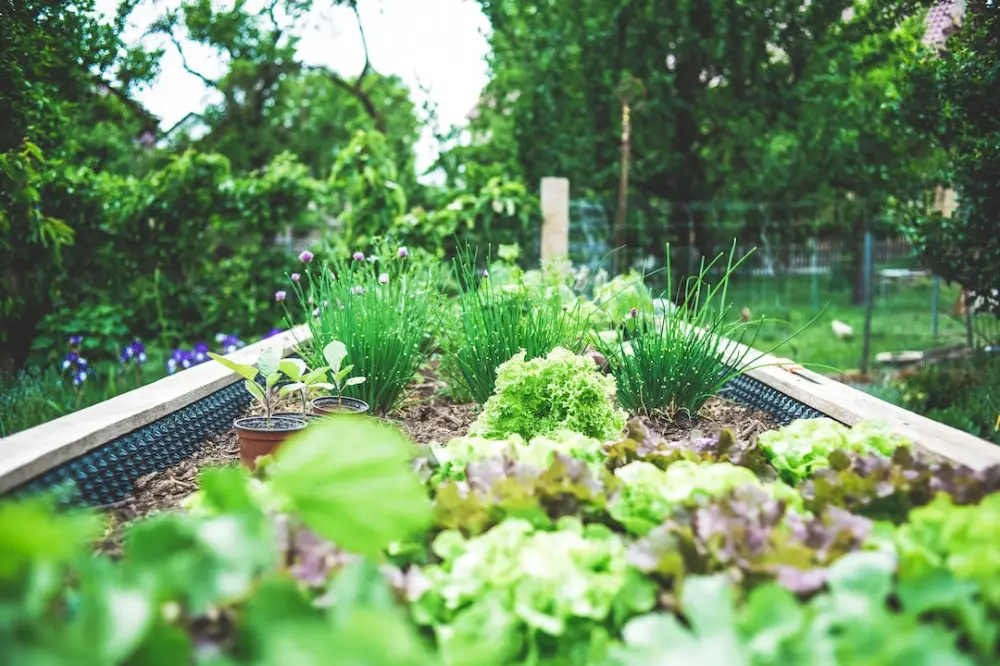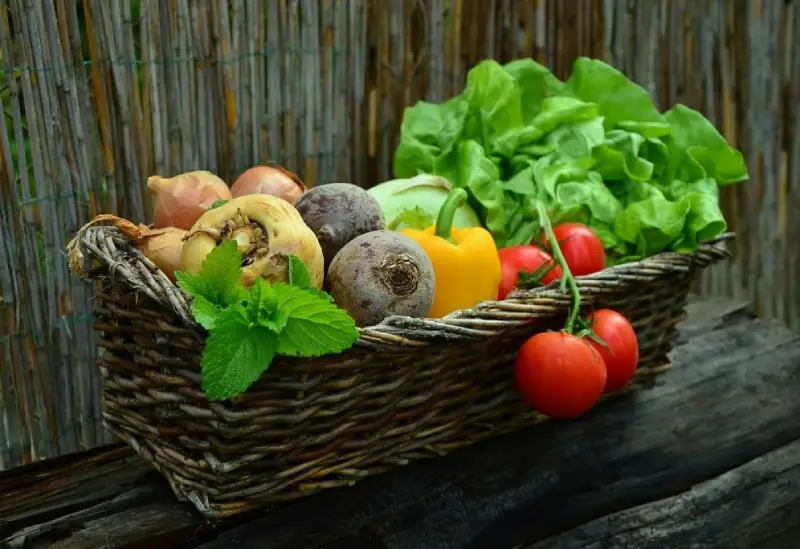Organic Backyard Garden

Imagine stepping outside into your own Organic Backyard Garden. Where the vegetables and fruits that grace your table have sprouted from the very ground you walk on.
This isn’t just a dream, it’s the principle of organic gardening right in your own backyard.
So, what exactly is organic gardening?
It’s a method of growing plants without using synthetic pesticides, fertilizers, or genetically modified organisms. It focuses on fostering a healthy ecosystem by using natural materials and promoting biodiversity.
The roots of organic gardening stretch back to traditional farming practices that were naturally free from synthetic chemicals.
However, as industrial agriculture became the norm, a dedicated faction began to champion the organic movement. Arguing for the return to more natural and sustainable methods.
Today, organic gardening has blossomed into a respected and beloved approach, with many embracing it for its numerous benefits.
You’re going to find out about the varied advantages that organic gardening can impart. It’s not just to your dining experience, but beyond.
From bolstering the nutritional content of your home-grown tomatoes. While enriching the soil that anchors the plant roots, organic gardening promises you many rewards.
So, we move to the next section, we’ll explore more about the nutritional advantages of each organic bite. There’s a whole world of taste and health benefits poised at your fingertips. Or in this case, at the edge of your garden spade.
Nutritional Benefits of Home-Grown Organic Produce
Now, you might wonder if the extra elbow grease involved in sticking to organic methods really pays off when it comes to the nutritional value. It does.
Multiple studies have suggested that organically grown fruits and vegetables can have higher levels of certain nutrients compared to their conventionally grown counterparts.
Specifically, one of the biggest perks of growing your own organic produce is that you completely sidestep the synthetic pesticides and fertilizers. These chemicals can have numerous adverse effects on your health, something you don’t need to worry about with organic gardening.
Once harvested, your garden bounty can become a centerpiece of a healthier diet. There’s something incredibly satisfying about biting into a tomato or snapping a green bean in half, knowing it’s packed with goodness and without any unwanted chemicals.
Plus, remember the freshness factor – freshly picked produce retains nutrients better than store-bought items that may have been sitting on shelves for days.
Now, let’s not overlook the fact that by growing your own organic food, you’re also ensuring that ‘organic’ means exactly that. No worrying about misleading labels or whether the food that claims to be organic is truly pesticide-free.
Besides being a good decision for your health, with organic gardening you’re in control from seed to plate.

Environmental Impact of Organic Gardening
So, you’re thinking about the earth? That’s admirable, and your backyard can play a significant role.
An organic garden isn’t just about keeping things natural, it’s also about making a positive dent in environmental health. By avoiding synthetic chemicals, you support ecosystems right in your backyard.
Let’s talk about biodiversity. Organic gardens are a haven for beneficial insects, birds, and microorganisms.
You’re going to find out about how ditching the pesticides creates a safe space for bees to buzz and worms to wriggle, which are crucial for pollination and soil health.
But it isn’t just about the animals; it’s also about the land and water.
Synthetic fertilizers and pesticides often leech into the groundwater, contaminating our precious water supplies. By going organic, you prevent harmful substances from disrupting the delicate balance of local ecosystems.
Here’s something else to consider. When you grow your own organic produce, you cut down on the transport costs attached to store-bought fruits and veggies.
That’s a key factor in reducing your family’s food bill from the added cost savings.
Furthermore, the benefits of organic gardening extend past our individual gardens. They ripple outward to the larger community, proving that small actions can lead to significant impacts.
Mental and Physical Well-being
Have you ever felt a rush of calmness when you’re surrounded by greenery?
Well, gardening isn’t just about growing plants; it’s about cultivating your own well-being. Engaging in organic gardening offers many therapeutic benefits.
We love to walk barefoot in our gardens and feel the energy of the earth while surrounded by all the living plants and trees.
The act of nurturing plants can lower stress levels and enhance mood, leading to improved mental health. Regular tending to your garden, in essence, means you’re also taking care of your mental state.
The act of nurturing plants can lower stress levels and enhance mood, leading to improved mental health. Regular tending to your garden, in essence, means you’re also taking care of your mental state.
Therefore, the benefits extend beyond your mental state. Organic gardening requires a fair bit of digging, planting, pruning, and weeding.
This translates to a consistent form of physical exercise that can contribute to muscle building, stamina, and overall cardiovascular health.
Who knew that nurturing tomatoes and tending to tulips could be just as good for your body as a session at the gym?
Another underappreciated aspect is the vitamin D you can soak up from the sun while out in your garden. Just don’t forget to put on a hat and gloves to protect your skin.
Vitamin D is crucial for bone health and immune function. Many people are deficient and don’t get enough due to their lifestyle.
Remember, as plants grow and thrive, your bones can too.
Finally, organic gardening instills a sense of accomplishment. Watching a seed grow into a full-blown plant due to your efforts can be incredibly satisfying.
Sharing the fruits, quite literally, of your labor with family and friends can nurture relationships as well as your garden.

Cultivating Life Skills and Community
I’m going to wrap up our discussion of organic gardening with a look at its broader implications.
This isn’t just about growing food; it’s also about the personal growth and community connections that come with it.
If you want to increase your family and friends with a sense of responsibility and awareness about where their food comes from, an organic garden is a great teacher.
Don’t worry about whether you’ll be perfect at it right away. After many years of organic gardening myself it’s less about expertise in the beginning and more about learning and adjusting as you go.
A lot is happening very quickly in our world today, and sometimes it can feel hard to keep up or make a meaningful impact. But here’s where organic gardening really shines.
It offers you a chance to make a difference in your own backyard. You’re going to find out about the importance of self-reliance and how every small choice contributes to a larger change.
Another important aspect is how gardening can help stitch together a community. Choose plants that you like, maybe heirloom tomatoes or medicinal herbs, and you’ll likely find others who share your passion.
This includes companies such as local nurseries, gardening clubs, and farmers’ markets, supporting the local economy and making connections with like-minded individuals.
In conclusion, navigating the green path of organic gardening offers many rewards beyond just the food on your plate.
It cultivates life skills, bolsters your health, helps the environment, saves money, and, perhaps most importantly, it connects you with others.
I really hope that you’re inspired to give it a shot – because when it comes to organic gardening, it’s not just the plants that grow; people do too.
Please, if you are looking for support on your wellness journey feel free to contact us directly if you have any questions.
Subscribe now to get a user-friendly “Get Started” guide featuring 12 tips for transitioning to a WFPB diet.
Cheers,
Plantaful Life Team
Disclaimer: The information shared in this blog post and on our website is for educational and informational purposes only. We are here to inspire and support you on your plant-based journey. However, always prioritize your health and consult with your trusted healthcare provider for personalized advice. By using our website, you acknowledge and agree that you have read and understood this medical disclaimer. Additionally, you acknowledge the significance of seeking professional medical advice for your specific health needs.
References:
Earthing Grounding Benefits – Plantaful Life
5 Benefits of Gardening That Can Improve Your Health (clevelandclinic.org)
Power of Plant Superfoods – Plantaful Life
8 Surprising Health Benefits of Gardening | UNC Health Talk (unchealthcare.org)